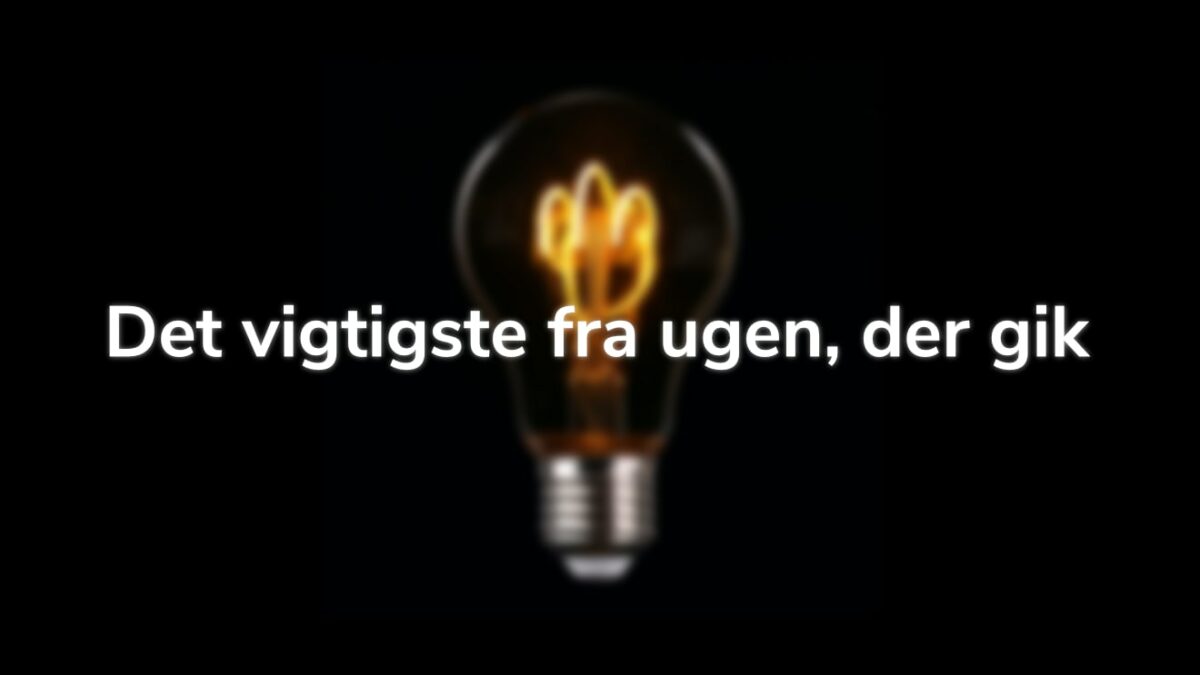Uge 38, 2024

Her har du den mest komplette opdatering på sociale medier og digital udvikling i mediebranchen. Du bliver holdt opdateret og sparer masser af tid.
Digital Ugerevy udgives af mig, Lars K Jensen, og jeg arbejder til daglig med audience-udvikling i Berlingske-koncernen.

Gør som de andre. Få overblikket allerede i indbakken:
Del 1: Sociale medier

Her finder du historier om eller fra de store sociale platforme, der har en enorm rolle at spille i kontakten mellem udgiver/afsender og modtager.
🧒 Instagram lancerer teenage-profiler
Meta is putting Instagram users under the age of 18 into new “teen accounts” to allow parents greater control over their activities, including the ability to block children from viewing the app at night.
Mere:
- Instagram overhauls teen accounts with sweeping privacy, age-verification changes [Axios]
- Instagram boosts privacy and parental control on teen accounts [BBC]
- Instagram makes teen accounts private by default [Platformer]
- What if the panic over teens and tech is totally wrong? [Vox]
🙌 YouTube introducerer "Hype"
If a video's been out less than 7 days from a creator with under 500,000 subscribers, you can "hype" it – and go beyond liking and sharing. The more hype it gets, the higher it climbs on a new leaderboard with the top 100 hyped videos from the week. Anybody can hype up to three times per week. In the future, we plan to allow fans to purchase additional hypes, unlocking another revenue stream for creators, too.
👻 Snapchat præsenterer AI-videoværktøjer
Snapchat [...] is now pushing the boundaries of artificial intelligence with a new in-app tool that allows creators to “make engaging videos with AI from a simple text, or soon, image prompt,” according to Ceci Mourkogiannis, the company’s vice president of product, who delivered the keynote at Snap’s 2024 Partner Summit on Tuesday.
🛑 Meta forbyder russiske statsmedier
Meta, der blandt andet ejer Facebook, har indført et forbud mod det russiske statsmedie RT samt andre statslige medier i Rusland. Det oplyser Meta natten til tirsdag dansk tid i en skriftlig udtalelse.
Mere:
- Meta bans RT days after U.S. accused Russian outlet of disinformation [NBC News]
👊 Sagen mod TikTok er i gang
Fra Columbia Journalism Review:
On Monday, TikTok and the Department of Justice faced off in a DC courtroom to determine the constitutionality of the bill. Some observers called it the most important two hours in the app’s history.
Mere:
- TikTok Ban Moves Closer to Reality While App’s Users Ignore the Obvious [Bloomberg]
😟 Kæledyrsrygter fornyer brand safety-diskussion om YouTube
Large organizations and brands saw their advertising dollars funneled to videos amplifying inflammatory narratives, underscoring how difficult it can be to maintain brand safety online.
😏 X sniger sig ind i Brasilien
Thanks to Elon Musk’s X, though, we can now consider a new form of ban evasion: one in which an entire platform attempts to get back online after being blocked by the government.
☁️ Bluesky runder 10.000.000 brugere
Social network Bluesky said Monday that it now has more than 10 million users. This is largely thanks to the rapid growth of the network in the past few weeks after Elon Musk-owned X was shuttered in Brazil.
Mere:
- Bluesky addresses trust and safety concerns around abuse, spam, and more [TechCrunch]
🔮 Rummer fediverset også muligheder for medier
Using the social web as a news distribution platform has become more difficult and less fruitful. The fediverse offers wide reach but has issues of its own
😡 "Rage baiting" virker også på Threads, ser det ud til
This kind of rage bait is effective and largely harmless. In the best light, it helps us reinforce our norms, and it feels cathartic to scold someone who breaks them. It's almost reverse trolling, where instead of harassing people you're inviting them to harass you.
Del 2: Digitale tendenser

Her kan du læse nogle af ugens tendenser indenfor medier. Det kan være en ny metode eller tilgang, branchen forsøger at tage til sig.
🙏 Influencere vil have eget nævn
Forbund håber på eget nævn til at håndhæve etiske retningslinjer og håber på tilslutning fra kommercielle partnere. ”I sidste ende er influenterne ansvarlige for det, de bringer,” lyder det dog.
Læs også:
- Ordførere lufter interesse i et pressenævn for influencer-indhold [MediaWatch]
😲 Flere danske medier har vist svindelannoncer
På TV 2, Euroinvestor og Ekstra Bladet dukker der med jævne mellemrum falske annoncer op, som reklamerer for en AI-applikation, hvor man kan tjene rigtig mange penge.
🙅♂️ Google skal alligevel ikke betale EU-milliardbøde fra 2019
The European Union’s second-highest court on Wednesday said a 1.5 billion euro ($1.67 billion) antitrust fine imposed on Google by regulators should be annulled.
Og på dansk:
- EU-domstol ophæver milliardbøde til Google [MediaWatch]
🧑⚖️ Retssagen mellem Google og DOJ fortsætter
- Google sheds its nice guy poise as the legal heat dials up [Digiday]
- Ad tech rivals reveal how Google stifled competition in DOJ antitrust testimony [Digiday]
- Google might be close to a breakup, but sources warn authorities to ‘be careful what you wish for’ [Digiday]
- Even Facebook Couldn’t Compete With Google, Ex-Ad Chief Says [Bloomberg]
- How Google got away with charging publishers more than anyone else [The Verge]
- DOJ vs. Google: Can the digital media industry learn from the last 15 years? [Digiday]
Del 3: Business

Her kan du læse nogle af ugens historier og tendenser indenfor forretningsudvikling i mediebranchen. Altså det, der handler om at tjene penge.
🎧 DRs uafhængighedsstrategi har skaffet flere lytninger
I fjor besluttede DR at trække flere podcast-titler hjem fra platforme som Itunes eller Spotify. Det har virket, er meldingen fra DR, som er ”super stolte” over udviklingen.
🪩 Zetland-kampagne har givet 6.000 nye medlemmer
Ambassadørkampagnen går ud på, at Zetlands medlemmer kan anbefale mediet til sine bekendte, som så kan skrive sig op som medlem til valgfri pris for den første måned, hvorefter den månedlige pris er 139 kr. per måned.
☝️ Har du en god annonceidé?
Alle idéer til, hvordan digitale annoncører kan overtales til at placere deres annoncer hos traditionelle danske medier, er velkommen i et nyt initiativ, som IAB Denmark har sat i søen. IAB er en brancheforening for aktører på det digitale annoncemarked.
🤑 Nu kan du annoncere i YouTube-pauser
Now, YouTube confirms advertisers can broadly target your paused screentime: “As we’ve seen both strong advertiser and strong viewer response, we’ve since widely rolled out Pause ads to all advertisers,” YouTube comms manager Oluwa Falodun confirms to The Verge.
📉 Avisernes annoncemarked fortsætter nedad
Annoncemarkedet for de danske dagblade har været støt faldende de seneste år, og den udvikling fortsætter i andet kvartal.
Mere nedad:
- Størstedelen af landets dagblade mister læsere [MediaWatch]
📈 Spotifys annonceforretning vokser
Spotify’s advertising revenue is forecast to reach $2.1bn in 2024, up 13.0% year-on-year, with revenue rising to $2.6bn in 2026
✨ Google præsenterer nye AI-værktøjer til annoncører
Google has announced a range of new AI updates for Google Ads, as part of its presentation at DMEXCO, one of Europe’s top digital marketing events. The new features include advanced AI creation assistance, AI asset generation, new AI parameter controls, improved reporting, and more.
🤝 Discord rekrutterer til annonceforretning
Discord is looking to beef up its advertising offerings — and it’s assembling a team of gaming industry experts to accomplish the task.
Del 4: Udvikling og tech

Her får du et kig på nogle af ugens historier indenfor den digitale udvikling og teknologi, der enten direkte eller indirekte kan have betydning for medier/udgivere.
💡 Hvad lærte Financial Times af at arbejde med AI?
Do not throw away the opportunities the new tech brings just because you are too scared of the threats (or you cannot be bothered to experiment)
🗣️ The Economist fortæller om deres AI
Ludwig Siegele, senior editor for AI initiatives at The Economist, told Press Gazette that AI translation will never be a “solved problem”, especially in journalism because it is difficult to translate well due to its cultural specificities.
😱 AI indtager YouTube Shorts
Hvad kan dog gå galt..?
Now, just a few years later, Google has announced plans for a tool inside of the YouTube app that will allow anyone to generate AI video clips, using the company’s Veo model, and directly post them as part of YouTube Shorts.
😌 AI-indhold ser ikke ud til at have påvirket valg i Europa
These findings are in line with recent warnings from experts that the focus on election interference is distracting us from deeper and longer-lasting threats to democracy.
🔁 UK: Meta forsøger igen at træne AI på offentlige posts
Meta has confirmed that it’s restarting efforts to train its AI systems using public Facebook and Instagram posts from its U.K. userbase.
🤔 Google vil gøre det lettere at adskille falske og ægte billeder
Google is planning to roll out a technology that will identify whether a photo was taken with a camera, edited by software like Photoshop, or produced by generative AI models.
🆘 Guide: Sådan prompter du OpenAIs o1-modeller
Using GPT-o1 will be slightly different than prompting GPT‑4 or even GPT-4o. Since this model has more reasoning capabilities, some regular prompt engineering methods won’t work as well. Earlier models needed more guidance, and people took advantage of longer context windows to provide the models with more instructions.
Mere:
- Why OpenAI’s new model is such a big deal [MIT Technology Review]
⚠️ OpenAI sender advarsler til brugere, der spørger ind til ny model
OpenAI truly does not want you to know what its latest AI model is “thinking.” Since the company launched its “Strawberry” AI model family last week, touting so-called reasoning abilities with o1-preview and o1-mini, OpenAI has been sending out warning emails and threats of bans to any user who tries to probe how the model works.
🕶️ Snap præsenterer nye briller
Anyway. Snap announced a new version of its Spectacles today. These are AR glasses that could finally deliver on the promises devices like Magic Leap, or HoloLens, or even Google Glass, made many years ago. I got to try them out a couple of weeks ago. They are pretty great! (But also: See above)
Mere:
- Snap’s latest spectacle [Platformer]
😯 AI-chatbot fik konspirationsteoretikere op af "kaninhullet"
Those conversations worked: They “reduced participants’ belief in their chosen conspiracy theory by 20% on average,” the authors write. The effect “persisted undiminished for at least 2 months” and “was consistently observed across a wide range of conspiracy theories, from classic conspiracies involving the assassination of John F. Kennedy, aliens, and the illuminati, to those pertaining to topical events such as COVID-19 and the 2020 U.S. presidential election, and occurred even for participants whose conspiracy beliefs were deeply entrenched and important to their identities.”
Mere:
- AI chatbots might be better at swaying conspiracy theorists than humans [Ars Technica]
👨⚖️ Californien vedtager deepfake-love
The state joins dozens of others in regulating the A.I. fakery in ways that could impact this year’s presidential race.